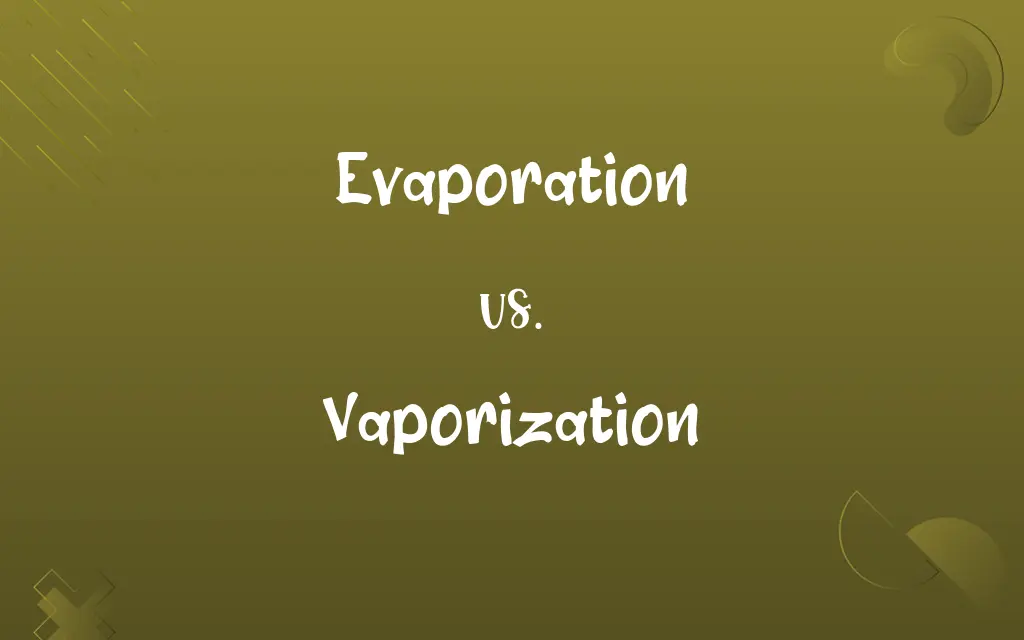Evaporation vs. Vaporization: Know the Difference

By Shumaila Saeed || Updated on December 25, 2023
Evaporation is the slow transition of a liquid to gas at a temperature below boiling; vaporization is the rapid change from liquid to gas at boiling point.

Key Differences
Evaporation is a surface phenomenon where molecules at the surface of a liquid gain enough energy to become a gas. In contrast, vaporization can occur throughout the liquid, especially when it reaches its boiling point. Both involve a liquid turning into a gas, but the processes and conditions under which they occur differ significantly.
Shumaila Saeed
Nov 16, 2023
Evaporation typically occurs at temperatures below the boiling point of the liquid. It's a gradual process where only some molecules with sufficient kinetic energy escape into the air. Vaporization, however, occurs when a liquid reaches its boiling point, and it's a much more rapid and energetic process as the entire liquid can turn into gas.
Shumaila Saeed
Nov 16, 2023
The energy source for evaporation can be the ambient temperature or the liquid's surroundings. It's a cooling process since it involves the liquid's surface molecules, which are higher in energy, leaving the surface. Conversely, vaporization requires external heat to bring the entire liquid to its boiling point, and it's an energy-intensive process.
Shumaila Saeed
Nov 16, 2023
Evaporation can happen under a wide range of conditions and is a common natural phenomenon, such as the drying of wet clothes. Vaporization, on the other hand, is often observed during cooking, like when boiling water turns into steam. Both processes are essential in nature and technology but occur under different circumstances.
Shumaila Saeed
Nov 16, 2023
In evaporation, the rate at which the liquid turns into gas is influenced by factors like surface area, temperature, and humidity. In vaporization, the rate is mostly dependent on the heat supplied and the liquid's boiling point. Both evaporation and vaporization play crucial roles in phenomena like the water cycle and industrial processes.
Shumaila Saeed
Nov 16, 2023
ADVERTISEMENT
Comparison Chart
Natural Occurrence
Common (e.g., drying clothes)
Less common (e.g., boiling water)
Shumaila Saeed
Nov 16, 2023
ADVERTISEMENT
Evaporation and Vaporization Definitions
Evaporation
Gradual conversion of liquid to gas below its boiling point.
Morning dew evaporates as the sun rises.
Shumaila Saeed
Nov 16, 2023
Vaporization
Rapid conversion of a liquid to gas at its boiling point.
The vaporization of water in a kettle produces steam.
Shumaila Saeed
Nov 16, 2023
Evaporation
Slow transition of a substance from liquid to gaseous state.
The evaporation rate of water increases on a hot day.
Shumaila Saeed
Nov 16, 2023
Vaporization
Energetic phase change of a liquid under external heat.
In industrial settings, the vaporization of chemicals is controlled for safety.
Shumaila Saeed
Nov 16, 2023
Evaporation
Natural cooling process affecting liquids in various conditions.
Evaporation of sweat cools the body during exercise.
Shumaila Saeed
Nov 16, 2023
ADVERTISEMENT
Vaporization
Total transition of a liquid into gas during boiling.
Vaporization occurs in a pot of boiling soup.
Shumaila Saeed
Nov 16, 2023
Evaporation
Surface phenomenon where some molecules escape into the air.
The evaporation of water from a lake contributes to cloud formation.
Shumaila Saeed
Nov 16, 2023
Vaporization
Boiling process involving entire liquid mass.
The vaporization rate of water increases with added heat.
Shumaila Saeed
Nov 16, 2023
Vaporization
Intense energy transfer leading to a gaseous state.
The vaporization of liquid nitrogen is extremely rapid.
Shumaila Saeed
Nov 16, 2023
Evaporation
To draw moisture from, as by heating, leaving only the dry solid portion.
Shumaila Saeed
Oct 19, 2023
Vaporization
The act or process of vaporizing, or the state of being converted into vapor; the artificial formation of vapor; specifically, the conversion of water into steam, as in a steam boiler.
Shumaila Saeed
Oct 19, 2023
Evaporation
The process in which all or a portion of liquid (in a container) is turned into vapour, in order to increase the concentration of solid matter in the mixture.
Shumaila Saeed
Oct 19, 2023
Evaporation
The process by which any substance is converted from a liquid state into, and carried off in, vapor; as, the evaporation of water, of ether, of camphor.
Shumaila Saeed
Oct 19, 2023
Evaporation
The transformation of a portion of a fluid into vapor, in order to obtain the fixed matter contained in it in a state of greater consistence.
Shumaila Saeed
Oct 19, 2023
Evaporation
Energy-dependent phase change occurring at ambient temperatures.
The evaporation of petrol from an open container is rapid.
Shumaila Saeed
Nov 16, 2023
Repeatedly Asked Queries
How does vaporization occur?
Vaporization happens when a liquid is heated to its boiling point, causing a rapid transition to gas.
Shumaila Saeed
Nov 16, 2023
What is evaporation?
Evaporation is the process where a liquid slowly turns into gas at temperatures below its boiling point.
Shumaila Saeed
Nov 16, 2023
Is vaporization a quick process?
Yes, vaporization is quick, especially compared to evaporation.
Shumaila Saeed
Nov 16, 2023
Can evaporation occur at any temperature?
Yes, evaporation can occur at almost any temperature, as long as some molecules have enough energy.
Shumaila Saeed
Nov 16, 2023
What factors affect evaporation?
Surface area, temperature, and air humidity influence the rate of evaporation.
Shumaila Saeed
Nov 16, 2023
Does vaporization require a heat source?
Yes, vaporization typically requires an external heat source to reach the boiling point.
Shumaila Saeed
Nov 16, 2023
Can we see the process of vaporization?
Yes, such as seeing steam when water boils.
Shumaila Saeed
Nov 16, 2023
Can evaporation occur indoors?
Yes, evaporation can happen in any environment.
Shumaila Saeed
Nov 16, 2023
Does evaporation always involve the entire liquid?
No, evaporation typically occurs at the surface.
Shumaila Saeed
Nov 16, 2023
Is evaporation important in nature?
Yes, it's crucial in processes like the water cycle.
Shumaila Saeed
Nov 16, 2023
Is evaporation a cooling process?
Yes, evaporation is a natural cooling process.
Shumaila Saeed
Nov 16, 2023
What is a common example of vaporization?
Boiling water to produce steam is a common example.
Shumaila Saeed
Nov 16, 2023
Do both evaporation and vaporization require energy?
Yes, but vaporization generally requires more energy.
Shumaila Saeed
Nov 16, 2023
Does evaporation have a cooling effect on the environment?
Yes, it can cool the surroundings.
Shumaila Saeed
Nov 16, 2023
Is vaporization only associated with water?
No, it can occur with any liquid.
Shumaila Saeed
Nov 16, 2023
What happens to the temperature during vaporization?
It usually remains constant at the boiling point.
Shumaila Saeed
Nov 16, 2023
Is evaporation a selective process?
Yes, only certain molecules with enough energy evaporate.
Shumaila Saeed
Nov 16, 2023
Does vaporization require special conditions?
Generally, it just needs sufficient heat to reach the boiling point.
Shumaila Saeed
Nov 16, 2023
Are both processes essential in daily life?
Yes, they play vital roles in many natural and human-made processes.
Shumaila Saeed
Nov 16, 2023
Can vaporization occur under pressure?
Yes, and it can alter the boiling point.
Shumaila Saeed
Nov 16, 2023
Share this page
Link for your blog / website
HTML
Link to share via messenger
About Author
Written by
Shumaila SaeedShumaila Saeed, an expert content creator with 6 years of experience, specializes in distilling complex topics into easily digestible comparisons, shining a light on the nuances that both inform and educate readers with clarity and accuracy.









































































